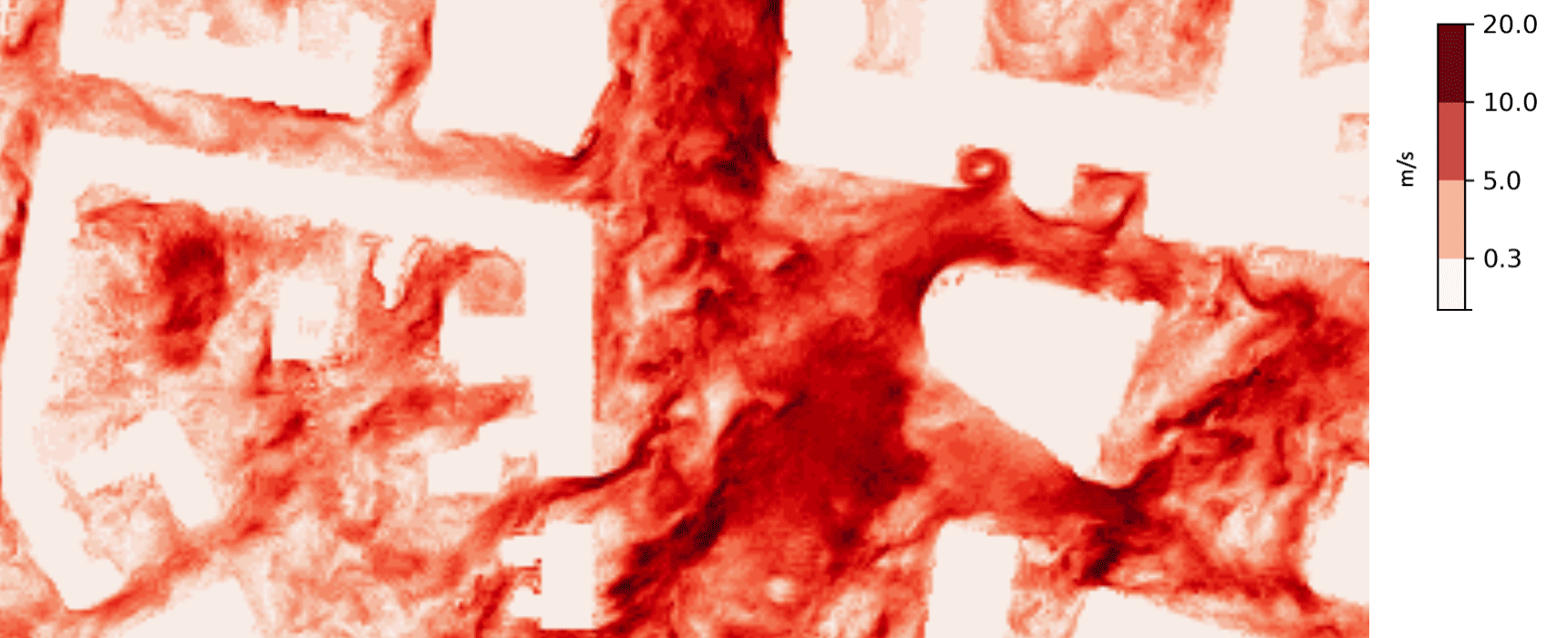Intelligence for cities (I4C)
Intelligence for Cities (I4C) is a joint project between the Albert-Ludwigs-University of Freiburg, the Freiburg-based Fraunhofer Institutes ISE and IPM and the Sustainability Centre Freiburg. I4C is funded by the German Federal Ministry for the Environment, Nature Conservation and Nuclear Safety (BMU) through the funding initiative "KI Leuchttürme".
Due to their spatial and social structure, cities are vulnerable to extreme weather events such as heat waves, heavy precipitation events and flooding or storms. In a changing climate it is projected that the frequency and intensity of extreme weather events is generally increasing in our latitudes. The long-term protection of urban populations and local economies to the changing climate presents cities with an enormous challenge.

A simulation of a storm event in the city centre of Freiburg shows the chaotic and complex nature of wind and turbulence at pedestrian level. Simulations like this are computationally very expensive. We aim at using AI to emulate common and repeating features in this complexity and allow for fast forecasting of wind hazards and damage at high resolution in cities (Simulation: D. Schindler, J. Wehrle).
Digital innovations in the form of artificial intelligence (AI) could make a significant contribution to adapt to a changing climate. AI enables precise and rapid execution of complex calculations of meteorological variables in three-dimensional urban space. The rapid computation allows for small-scale building-level predictions as well as long-term local climate predictions. Small-scale forecasts allow better estimation of local impacts of extreme weather events. Long-term forecasts, on the other hand, allow for intelligent spatial planning taking into account different climate projections, the local frequency of urban climate hazards, and urban development scenarios.
The goal of I4C is to improve the adaptation of cities to climate change through a process chain from data collection, analysis and environmental forecasting to concrete measures. The Chair of Environmental Meteorology is involved in the project with two sub-projects which include the downscaling / prediction of thermal comfort and stress at local, building-resolved scale using AI and the prediction of storm impacts and storm damage using large eddy simulation (LES) and AI.
Further information on this project:
→ Webpage of the project at the Sustainability Centre Freiburg (in German)
→ Webpage of the project in the program "KI Leuchttürme" (Zukunft – Umwelt – Gesellschaft, in German)
Researchers involved
- Prof. Dr. Andreas Christen (Work package leader "Heat")
- Prof. Dr. Dirk Schindler (Work package leader "Wind")
- Prof. Dr. Andreas Matzarakis (Scientific collaborator)
- Ferdinand Briegel, M.Sc.
- Jonas Wehrle
Collaborators
Selected publications
- Briegel F, Wehrle J, Schindler D, Christen A, 2024: High-resolution multi-scaling of outdoor human thermal comfort and its intra-urban variability based on machine learning. Geoscientific Model Development, 17, 1667-1688.
- Briegel F, Makansi O, Brox T, Matzarakis A, Christen A, 2023: Modelling long-term thermal comfort conditions in urban environments using a deep convolutional encoder-decoder as a computational shortcut. Urban Climate 47: 101359.

